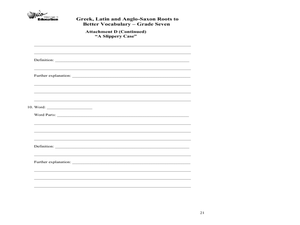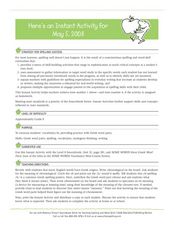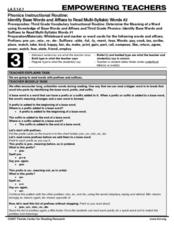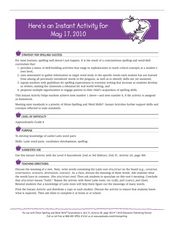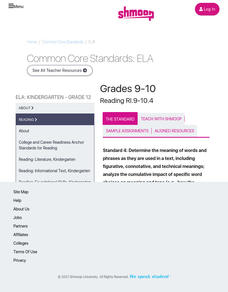Curated OER
It's Greek To Me!
In this language lesson, scholars use Greek root meanings to determine the meaning of words. After being shown how Greek roots are used in many words, such as, photosynthesis, pairs are given two excellent black line masters embedded in...
Curated OER
Greek, Latin and Anglo-Saxon Roots to Better Vocabulary
Practice vocabulary skills with this word analysis lesson. Middle schoolers examine the roots of unfamiliar words and use their knowledge of roots to discern meaning through word analysis.
Curated OER
Using Prefixes, Suffixes and Root Words to Improve College Level Vocabulary
Grow vocabulary skills with an understanding of affixes and word roots. Included here are a few activities and plenty of materials you can use to support your learners as the focus on building vocabulary.
Meadows Center for Preventing Educational Risk, University of Texas at Austin
Lesson 11 - Affixes with Unchanging Base Words
Adding an affix to a word sometimes changes its meaning, just like magic. Using 11th of 17 lessons in the Word Recognition and Fluency series, readers become vocabulary magicians, learning to form and decode words that contain common...
Curated OER
Using Word Parts to Infer Meaning
Students examine the importance of physical activities and use word parts to infer meaning to a story. They discuss agility, baseball, and ballet dancing, read an article, and observe a demonstration on breaking down words and examining...
Curated OER
Some Words Have Greek Word Parts
Ninth graders complete spelling exercises using Greek word parts. In this Greek word parts lesson plan, 9th graders complete an oral assignment to spell with Greek word parts and a worksheet.
Curated OER
Etymology
Learners dissect and build words from parts like prefixes, base words, suffixes, and inflectional endings. Etymology skills help us find the meanings of words by identifying the different parts that constitute them. Class members use...
Curated OER
Cloudy With a Chance of Meatballs-Part I
Here is a lesson plan that gives learners a chance to practice using context clues. They read the story, Cloudy with a Chance of Meatballs. Young scholars use different word strategies (base words, synonyms, antonyms) to decode and...
Meadows Center for Preventing Educational Risk, University of Texas at Austin
Lesson 10 - Compound Words
Individually, words have power, but when added together, they can take on a whole other level of meaning. Readers learn about compound words in the 10th of 17 lessons of the Word Recognition and Fluency series. A script provides guidance...
Curated OER
Vocabulary Instructional Routine: Multiple Meaning Words in Context
Tackle multiple-meaning words with your youngsters using this scaffolded instructional activity which features a detailed script. Begin with the word shoulder, using context clues to help scholars understand the meaning. Next, they...
Curated OER
Pendemonium: The Italian Job
Discover how to use prefixes and suffixes to determine the meaning of unfamiliar words. The group views a jovial video on the topic, and then they create a chart of prefix and suffix meanings to identify the meanings of words in a social...
Book Units Teacher
Skill Lessons – Prefixes and Suffixes
Sometimes the best way to understand a concept is to break it down. Young vocabulary pupils work with word parts in a hands-on activity that prompts them to connect flash cards with affixes to their root and base words. Additionally,...
Curated OER
Phonics: Identify Base Words and Affixes to Read Multi-Syllabic Words
Encountering a new an unfamiliar word can stump even the best readers. Third graders learn how to assess the base, prefix, and suffix of words to help them determine its meaning. The class works together to go over a series of common...
Curated OER
Create a Word
Brainstorm new words for a class dictionary. In small groups, young learners read and discuss an article about how words get into dictionaries. They then develop a new word, use it in a sentence, and share their creations with their peers.
Santa Monica-Malibu Unified School District
Parts of Speech Pronouns: Building Blocks of Grammar
Pronouns are the most helpful parts of speech! Model the ways that interrogative, indefinite, personal, and demonstrative pronouns can specify meaning and enhance writing with a hands-on activity.
EngageNY
Launching The Performance Task: Building Background Knowledge: “War in the Pacific,” Part 1
It's all about a bit of give and take. Scholars silently read War in the Pacific and circle any unfamiliar words. Using context clues, they write each word on a strip of paper along with the inferred definition. After looking the word up...
Novelinks
The Color of Water: Word Square Instructions
Immaculate, accumulation, dissipation. Vocabulary drawn from chapter 16 of James McBride's memoir, The Color of Water, can prove to be challenge for readers. To help kids understand the meaning of these words and what they add to the...
EngageNY
Mid-Unit Assessment: Author’s Craft: Analyzing Shakespeare’s Craft: Part 2
Annoyed or bewitched—how does an author's word choice affect a text? Scholars begin the instructional activity by analyzing word choice in Shakespeare's A Midsummer Night's Dream. Next, learners take a closer look at the narrative...
Curated OER
Man's Search for Meaning: Vocabulary Strategy
Readers of Man's Search for Meaning use context clues, create stories using words from the text, and retype these stories as part of their vocabulary study of Viktor Frankl's book.
EngageNY
Vocabulary Strategies and Questions from the Text: Close Reading Part 2 of The Lightning Thief (Chapter 3, Continued)
That is very unexpected! Scholars take a close look at the word unexpectedly from chapter three of The Lightning Thief. They examine the prefix and think of other words that have the same prefix. Learners regroup in their triads and take...
Curated OER
Exploring Latin Word Parts
Fourth graders complete a worksheet. In this root words lesson, 4th graders discuss the meaning of a root. Students view words with the Latin root stru/struct and discuss their meaning. Students repeat this process with other Latin root...
Shmoop
ELA.CCSS.ELA-Literacy.RI.9-10.4
Your pupils will be expected to determine the meaning of words and how those words affect the meaning of a text. Help them master this skill with the ideas listed here. First, look over the two activities that could be used for your...
Brigham Young University
Rosencrantz and Guildenstern Are Dead: Word Squares
Encourage your class to use a variety of strategies to learn and retain vocabulary words. The plan suggests that near the beginning of your reading of Rosencrantz and Guildenstern Are Dead pupils should find words in the text that are...
Curated OER
Vocabulary Building Through Visualization of Word Meanings to Create Digital Art
Use online dictionaries to define vocabulary words and create a visualization of word meanings through digital art. Middle schoolers go online to define assigned vocabulary words. They visualize the meanings of the words in photo...



